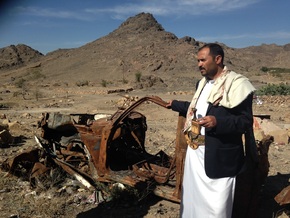 Mohammed al-Qawli showing his brother's car Mohammed al-Qawli showing his brother's car Mohammed al-Qawli, a former Headmaster in his late forties, has been restless for nearly a year. On January 23rd 2013, his brother, schoolteacher Ali Ali al-Qawli, was killed in a drone strike, alongside seven other men. They were traveling to the north of the village of Qawlan, half an hour from the Yemeni capital Sana’a, when four hellfire missiles hit their Toyota Hilux. Mohammed remembers hearing an explosion: he went out to see if the Hilux was still in the village, and that’s when he realized that something bad might have happened. He knew about drone strikes but discarded the possibility. The Americans had never targeted his area, notoriously close to the previous government elite. He and other village members travelled to the scene of the explosion: nothing could have prepared them for what they were about to see. The scene was on fire, filled with charred human remains and debris. The car had been moved 10 meters away from the impact of one of the missiles, close to a house on the other side of the road. Water was gushing from an irrigation tube, and men from a nearby village were walking aghast among the debris. Mohammed was on autopilot. Villagers pointed to a charred body at the back of the car, whose teeth were unmistakably those of his brother. Soon, security services turned up. All the officials cared about was to find the car’s number plates. They soon departed the scene. Afterwards, onlookers gathered all the remains they could find: more than one hundred. They were immediately taken to Sana’a for a forensic examination. Immediately after the strike, the Yemeni government declared that al-Qaeda operatives had been killed in the attack. This generated a massive protest from the local tribes, the government was forced to issue a retraction: Ali al-Qawli and all other occupants of the car were declared innocent of any crimes. Since Ali was a quiet schoolteacher with no links to any political organization, Mohammed started asking himself who else in the car could have been targeted. That’s when it dawned on him: a known opponent of former President Ali Abdullah Saleh was in the car, Rabieh Hamud Labieh. Labieh, a democratically elected local councilor, had turned against Saleh during the 2011 Arab Spring-related demonstrations. He was notorious for having denounced the smuggling of government weapons between Sana’a and Saleh’s fief, right after his demise. He had been an opponent to the new regime, arguing that th country was still a dictatorship. According to the Yemeni National Organization or Defending Rights and Freedoms (HOOD), the Yemeni government has been instrumental in assisting the US government with its strikes, from the collection of incriminating “evidence” to the collection human intelligence. In sum, the Yemeni government says who to strike, where and when. For Mohammed, it makes no doubt that the government used the US to get rid of its political opponent, a view shared by HOOD and Swiss-based NGO Alkarama. Not only is the “war on terror” not nearly over, but also one can conclude that the Arab Spring never really took off in Yemen, where Saleh’s successor, former vice-president Abd Rabu Mansour Hadi, continues to purge his political opponents. How much does it cost, in Yemen, to dispose of a democratically elected politician? One only needs powerful allies. Alkarama asserts that it would have been very easy to arrest Labieh and try him for treason. After all, there was a military police checkpoint only five hundred meters from the scene of the explosion. Four Hellfire missiles were launched at Labieh’s vehicle, preceded by more than a day of drone reconnaissance. Provided that the basic cost of a Hellfire is $65,000, counting the drone flying hours and personnel costs, the attack could have reached a $400,000 price tag for the US taxpayer. Since the Yemeni government cleared all occupants of any relationship with al-Qaeda after their death, this particular incident is proving to be a costly mistake. No compensation was offered to the families of the victims. Salim, the car’s driver, left behind an impoverished extended family. Ali left three ophans who are now being raised by Mohammed. Ali’s eldest, Mohammed Ali, asked me to film him as soon as I arrived in his house. He asks a very simple question to President Obama: “Sir, why did you kill my dad?” (1) As we parted, Mohammed says that he will never let go until he obtains an apology from the US government, and compensation for all its Yemeni victims. Whenever there is an attack elsewhere in the country, he races to the scene in own SUV, bought specifically for this reason. He then collects the remaining parts of the missiles and brings them to Sana’a. He has been documenting every strike since his brother’s death, and wows to do so until a missile strikes him eventually. Showing me part of a Hellfire that killed his brother, he defiantly claims: “this is the humanitarian aid we in Yemen get from the US, it is all one big lie, and I will never give up for all the victims’ sake.” (1) See the link to Mohammed Ali al-Qawli's question to President Obama: http://www.youtube.com/watch?v=Un0vxahkYFM
1 Comment
|
 RSS Feed
RSS Feed
